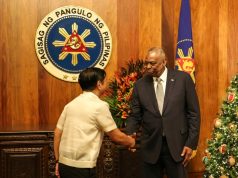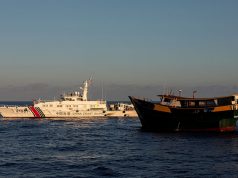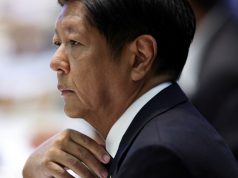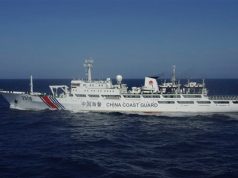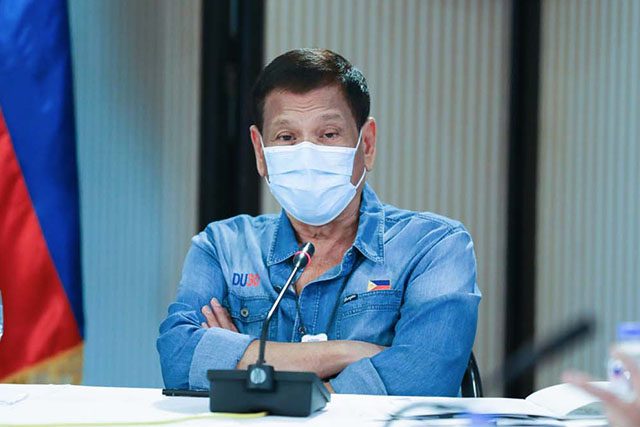
President Rodrigo Duterte in his recorded national address late Monday once again thanked Chinese President Xi Jinping for his supposed support to the country amid the pandemic.
This, despite the reported activities of Beijing in the disputed South China Sea.
The chief executive mentioned that his Chinese counterpart expressed “his full support” to Manila in fighting the novel coronavirus and dismissed the rumors that it was manufactured in a laboratory.
“I don’t know if I have to say this but I have a sort of a note from President Xi Jinping expressing his full support for us at this
time and citing what we did to help China and of course, to erase the—not really erase—but to counter the malign that they were suffering at early at this stage,” Duterte said in the televised address.
He also defended the Asian giant and said that it was not China’s fault that the virus originated from its region despite reports of cover-ups by the Chinese authorities.
Duterte, who is known for his openness towards pro-China policies, also reiterated that the Philippines can always count on Beijing for support, particularly in terms of treatments and aid against COVID-19.
“So he says that they are ready and I would like to thank President Xi Jinping for his support,” he continued in the speech.
“At kung galing lang China, wala kayong problems. I think we can have the priority anytime. It’s in the other countries, producing the antibody. But if China catches up with them, eh ‘di okay na,” Duterte said.
He previously said that he will “call on China to help” the country if the situation concerning the virus does not get better.
Sea and land operations
Duterte’s pro-China remarks, meanwhile, triggered some Filipinos who pointed out recent instances involving the Asian giant and resources in the Philippine territory despite his renewed gratitude to China.
Award-winning writer Ogie Rosa recalled a report detailing how China establishes research stations in Spratly Islands, particularly in Fiery Cross (Kagitingan) and Subi Reefs.
The territories are around 100 kilometers and 240 kilometers off Palawan, which is one of the Philippines’ premier tourist spots.
Duterte: I’d like to thank President Xi Jinping for expressing his support.
China: surveys Philippines reefs while donating virus tests pic.twitter.com/rrzwMdUcIm
— Ogie Rosa (@ogie_rosa) April 13, 2020
The research stations were reportedly meant to support China’s all-encompassing development programs in the South China Sea. According to a report from Philstar:
“Specifically, new Chinese facilities in Fiery Cross are envisioned to monitor coral reef biomes or the island’s flora and fresh water conservation, while those in Subi Reef will house seismic stability and fresh water monitoring systems.”
“Fiery Cross and Subi Reefs are two of Beijing’s “big three” militarized islands in the Spratlys, particularly transforming the former into a fortified airbase in 2017.”
China has been aggressively claiming territories in the West Philippine Sea, a portion of the disputed South China Sea which is claimed by the Philippines.
This comes despite the Permanent Court of Arbitration ruling in July 2016 that recognizes the Philippines’ sovereign rights over the areas contested by China within the former’s exclusive economic zone.
Reports about the research stations surfaced shortly before China donated COVID-19 test kits to the Philippines which were briefly deemed inaccurate by the Department of Health.
The DOH later on took back its words and said that the test kits were “at par” with the standards of the World Health Organization.
Meanwhile, GMA broadcast journalist Atom Araullo informed the public of a Chinese vessel permitted by the Department of Environment and Natural Resources to resume mineral ore extractions in Homonhon Island amid the enhanced community quarantine.
In other developments, mineral ore extraction by a Chinese-manned vessel in Homonhon island resumes after an earlier suspension by the DENR. https://t.co/zAjvLfF3E9
— Atom Araullo (@atomaraullo) April 13, 2020
Mines and Geosciences Bureau Director Wilfredo Moncano reasoned that it could be “to reduce the economic damage” caused by the virus.
Muntinlupa City Rep. Ruffy Biazon, on the other hand, said the DENR misappropriated the provision of the Inter-agency Task Force’s Resolution 14 on “unimpeded movement of all types of cargo.”
“It was meant ‘to avert any threat of shortage of basic food, essential hygienic products & medical products.’ Export of minerals has nothing to do with that,” the lawmaker said.
DENR misappropriated the provision of IATF Resolution 14 re “unimpeded movement of all types of cargo”. It was meant “to avert any threat of shortage of basic food, essential hygienic products & medical products”. Export of minerals has nothing to do with that. https://t.co/aNgWbMftCW pic.twitter.com/pzc3Pu0fjY
— Ruffy Biazon (@ruffybiazon) April 14, 2020
Residents, local government units of Eastern Samar and the Catholic Church have previously protested the Chinese vessel’s entry in the historic island where Portuguese explorer Ferdinand Magellan first landed when he discovered the Philippines.
On Tuesday, Vietnam also reported that a ship tracking data showed a Chinese survey ship which was embroiled in a standoff with Vietnamese vessels last year in the South China Sea, has returned to waters within Vietnam’s Exclusive Economic Zone.
RELATED: Chinese survey ship returns to Vietnam’s exclusive economic zone





